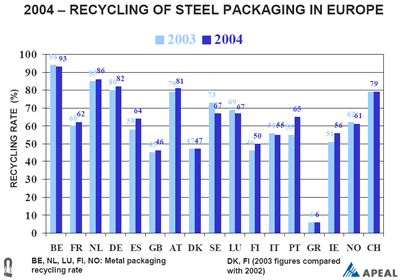Oct 20 2005
Over 2.2 million tonnes of post-consumer steel packaging were recycled in Europe last year. This represents a recycling rate of 60% in the enlarged EU1 and an estimated 62.5% in EU15 (up from 61% in 2003).
Over the last 5 years, remarkable progress has been made in terms of steel packaging recycling in the UK, Spain, Portugal & Italy with recycling increases of between +41% in the UK and +121% in Spain.
In Central and Eastern Europe, according to the level of collection infrastructure in place, recycling performances of Green Dot systems ranged from 11% (metals) in Lithuania to 43% (steel) in Hungary. The best progression in metal packaging recycling was registered in the Czech Republic (37% vs. 29% the year before).
Steel packaging offers value to society thanks to its exceptionally high recycling rates in Europe, enabling a continual recycling process to take place without any loss of quality. In this sense, steel is a truly renewable material.
”As steel scrap is an essential ingredient in steel manufacturing, there is always ample demand for recycled steel. Furthermore, since steel packaging is economical to collect and easy to separate (thanks to its magnetic properties), it is no surprise that steel consolidates its position year by year as leader in packaging recycling in Europe” said Philippe Wolper, managing director of APEAL.
Through increased recycling of steel packaging, resources such as iron ore and coal are preserved for future generations and energy use is vastly reduced. Over the last 10 years, more than 16 million tonnes of steel packaging have been recycled, saving 40 million tonnes of CO2 emissions, i.e. saving the equivalent CO2 emissions of 22 million cars, each car travelling an average of 10,000 km.
According to APEAL’s estimates, a 59% metal packaging recycling rate was achieved last year in the EU15, exceeding the legal requirements of 50% offset by the Packaging & Packaging Waste Directive. This represents 2.3 million tonnes of metal packaging recycled, more than 90% of which is steel packaging.
This performance results from the adaptability of steel to a wide range of collection systems (from mixed household waste to multi-material door-to-door collection systems) under the umbrella of integrated collection schemes. Such schemes are now commonplace in Europe and quickly progressing in new Member States and, importantly, not only collect beverage packaging but also all other household steel packaging applications (food cans, aerosols, etc.), whereas deposit systems are restricted to beverage containers.
Furthermore, those systems feature superior economic and environmental performance compared to deposit schemes: a study undertaken by BIO Intelligence Service earlier this year reveals that when a deposit system is implemented in parallel to an integrated system, costs of collection double, greenhouse gas emissions increase and other environmental impact indicators deteriorate, without any noticeable increased performance.
In the run up to 2008 the recyclability of steel will therefore continue to play a key role in helping European countries to meet their recycling targets, which have placed a greater onus on packaging companies to identify and use materials that offer a high recycling performance.

http://www.apeal.org/